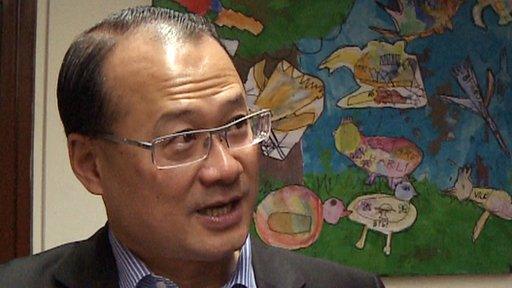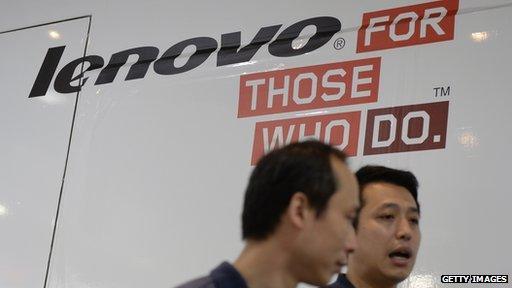Change in China for family succession
- Published
Chinese business leaders are starting to focus more on their business legacy than their family legacy.
Jonathan Choi was studying in Japan when his father called, demanding he return to Hong Kong to help run the family firm - a seafood trading company.
He soon became chief executive, in charge of the day-to-day running of the firm.
Four decades on, he has steered Sun Wah Group into a multi-billion pound empire spanning property development, the financial industry, infrastructure investments, technology and media services.
Mr Choi, now chairman, admits he knew "nothing" when he took the helm, but his father still gave him total freedom to take the firm in whichever direction he thought best.
Yet when asked if his own son, already working at Sun Wah Group, will become the third generation of the family to run the firm, he's not sure.
"The world has changed. When I took over my father's business it was only a seafood company. Today, I have built an international conglomerate. Can he really lead six big sectors? I don't know."

Jonathan Choi admits he knew "nothing" when he took the helm at his father's firm
Mr Choi says the complexity of the firm he has built means it may be too difficult for one person to manage.
"Those businesses we can run, we will run. If not, I think in the future the group may be just like a holding company. We hold the shares only, and let the right people do the right thing," he says.
For a Hong Kong firm, where family businesses are an established tradition as in most of Asia, Mr Choi's reticence to hand over the reins to his son is surprising.
Yet similarly, in mainland China, the founders of firms set up when the Chinese government began to open up the economy in the 1980s are approaching the issue of succession differently.
Maggie Cheng, general manager of the China Entrepreneur Club, a not-for-profit group of 46 of China's top entrepreneurs and business leaders, says leaders now want to give the top role to "better qualified people".
This of course can include their own children, but only once they have proved themselves. She says the leaders focus on financing a good education for their children, often overseas, and then encourage them to get work experience elsewhere.
"They have them make their own decisions and work in different international companies to start from the bottom to get the experience, and only then in their own company do they give them opportunities," she says.

Chinese leaders focus on giving their children a good education, often overseas
Leadership expert Steve Tappin believes a change in perspective has driven the shift.
"First-generation Chinese business leaders are starting to focus more on business legacy than family legacy," he says.
Huang Nubo, chair and founder of property and leisure giant Beijing Zhongkun Investment Group, is a good example.
He says his son currently works for an investment bank and might prefer to set up his own firm.

Chinese business leaders are starting to focus more on business legacy than family legacy
Regardless, he says he won't "narrow-mindedly pass it [the firm] down only to my son", but instead hopes to list the company on the stock exchange so that it belongs to the public.
His main concern is that the company he created and the work it does, such as restoring ancient villages, continues.
"Then, all my projects can be passed down and remain in a hundred years. Whether it's a Huang running it or not does not matter," he says.
As they expand, particularly overseas, Chinese companies are also learning from how their global counterparts do business.
Liu Jiren, chairman and chief executive of Neusoft, one of China's largest software and service businesses, helped to found the firm in 1991.
Once the company started doing business with non-Chinese firms, he realised it had to broaden its perspective.
He has appointed local people, rather than Chinese, to manage their overseas divisions in Japan, the US and Europe, and says this has enabled them to recruit the "best people" for the job.
"It's kind of challenging for Chinese going global, they always trust their own people, the people they're familiar with. We have success in Europe because of trust, because we tried to learn from the locals," he says.
Hiring locally means a firm is also likely to get the best person available for the job.

Lenovo founder Liu Chuanzhi says the solution is to create a "family business without a family"
Liu Chuanzhi, founder and chairman of Chinese computing giant Lenovo, says that this is the biggest problem with family succession - your son or daughter is unlikely to be the most talented person available.
Despite this, he believes a company handed on to a relative is likely to last longer because it means more to them.
He believes the solution is to create a succession plan which rewards senior staff as if they were family members, creating what he calls a "family business without a family".
At Lenovo, his senior staff are not related, but he has instead given them "a certain amount of shares" in the firm. He believes these share awards work as "a long-term material stimulus" and give them a more stable perspective, equivalent to that of a family member.
"You can be the leading authority of the company without holding an absolutely large percentage of the company's shares," he adds.
As for his own children, he's given them sufficient funds to start their own venture, if they so wish.
This feature is based on interviews by leadership expert Steve Tappin for the BBC's CEO Guru series, produced by Neil Koenig.